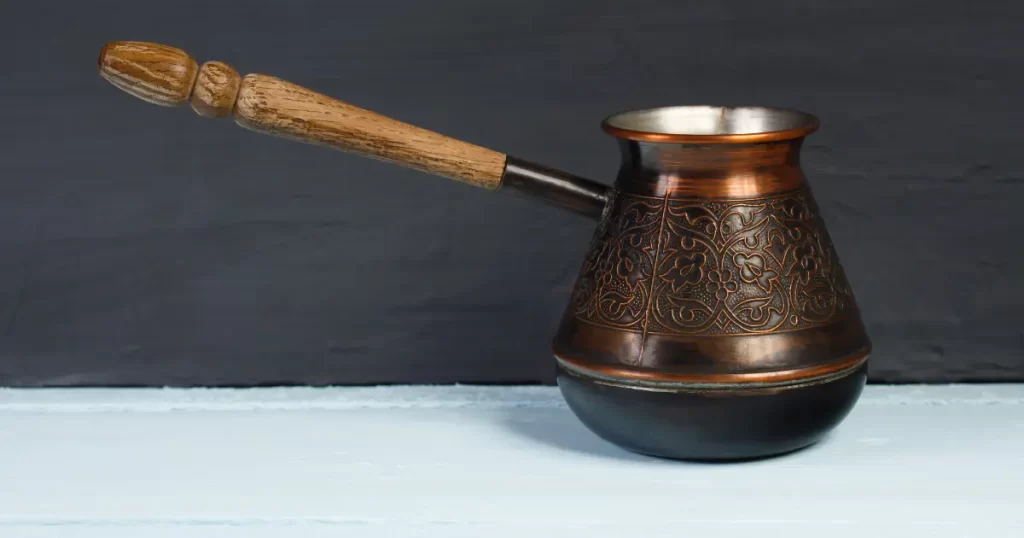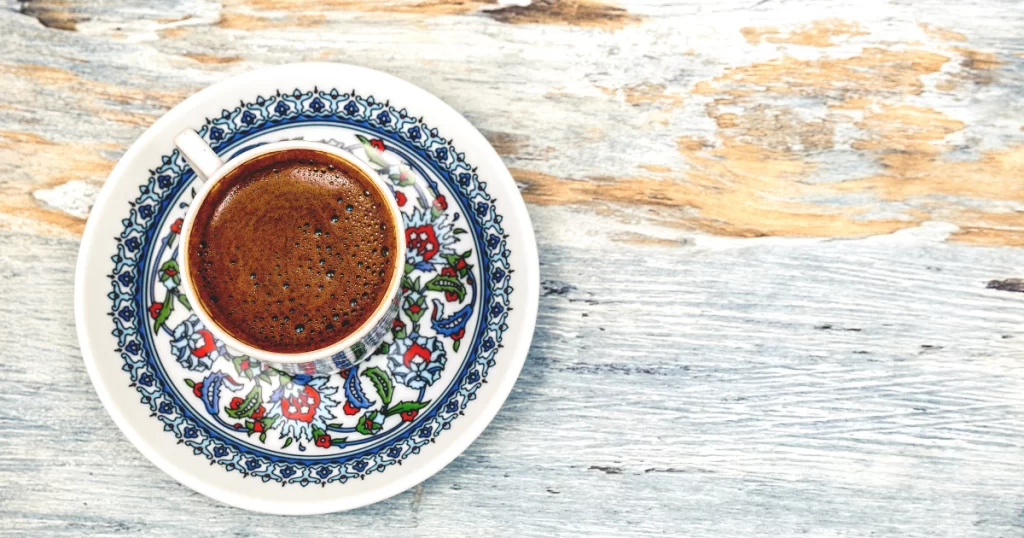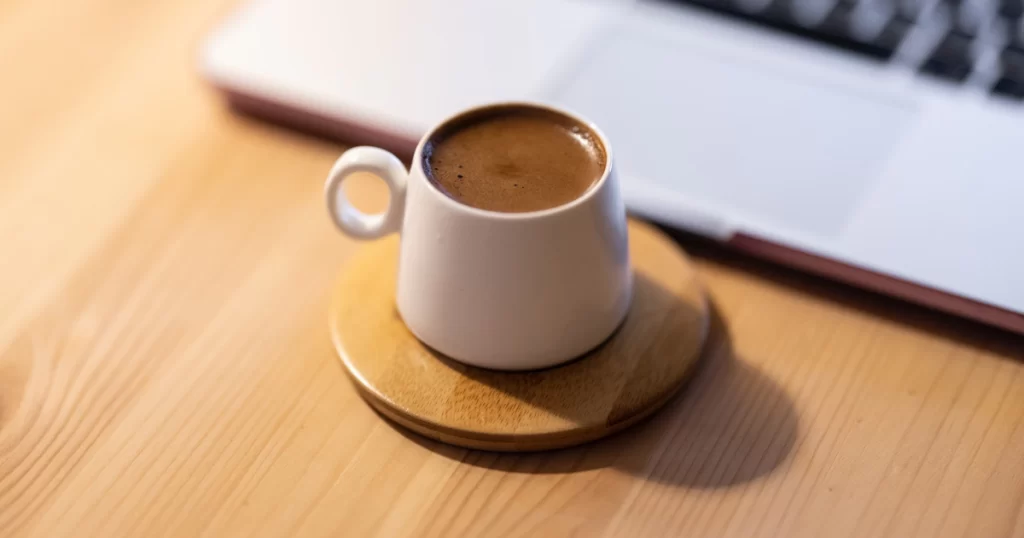The cezve is a tool that has been used for centuries to brew the perfect cup. Here you will learn why it is an essential part of Turkish coffee. If you still don’t have one, make sure to learn about the best Turkish coffee pots before you get it.
What is a Turkish coffee pot, known as cezve?
The cezve is a traditional small-sized pot made of copper or brass. It has a long handle and a narrow neck that widens towards the top. This distinctive shape is what sets it apart from other coffee brewing methods.
How to use a cezve?
When using a cezve, you start by adding finely ground coffee and water to the pot. The ratio of coffee to water varies depending on personal preference. Some like it strong, while others prefer a milder flavor. Experimentation is key here!
Cezves work well on both gas and electric stovetops. Their adjustable heat settings allow for precise control over the brewing temperature.
Unfortunately, most traditional Cezves are not compatible with induction cooktops. Induction stovetops work through magnetic fields, which require specific types of cookware to function. But don’t worry. There are Turkish coffee pots for induction stovetops that will give you an amazing taste and that oriental experience.
💡 Make sure to check out how to clean cezve before and after first use.
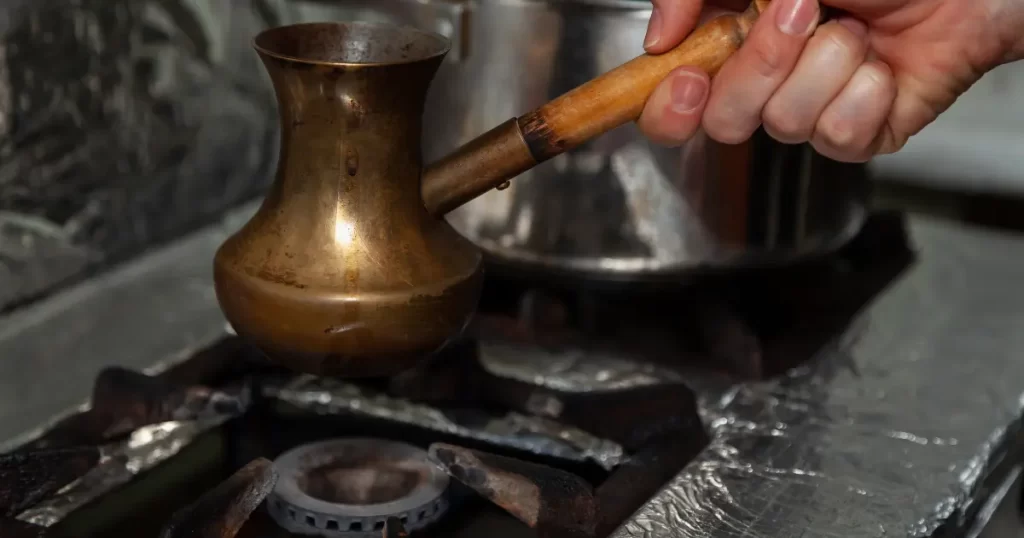
Can you make Turkish coffee in a regular pot, or do you need a cezve?
Yes, you can make it using a regular pot. It won’t have that recognizable taste, and you may end up with less foam, but it is still possible.
Here you can find a step-by-step guide on how to prepare a perfect cup of Turkish coffee in a regular pot.
What is the difference between cezve and ibrik?
The terms “cezve” and “ibrik” are often used to refer to the same type of pot. They both have a similar shape, featuring a long handle and a narrow neck that widens toward the top. Both of these pots are typically made of copper or brass.
However, there is a slight distinction between the two terms. “Cezve” is the more commonly used term in Turkey and the Middle East, while “ibrik” is the term used in other regions, particularly in the Balkans and Eastern Europe. So, the difference lies mainly in the regional terminology.
How to find the best Turkish cezve?
Size matters when it comes to choosing a cezve. The ideal size depends on how many cups of coffee you typically brew at once.
You should also consider the heat source at your home. Most cezves are designed to be used on gas or electric stovetops. However, if you have an induction stovetop, you’ll need to look for a cezve specifically designed for induction cooking.
Another important feature to consider is a protected handle. Traditional cezves often have long handles made of metal, which can get quite hot during the brewing process. Best cezves have wooden or plastic handles for protection against heat.
Which is the best size for a cezve?
If you usually brew just a single cup of Turkish coffee, a smaller cezve is the way to go. They are compact and easy to handle.
If you often find yourself brewing coffee for two or more people simultaneously, opting for a larger cezve is a wise choice. With a larger pot, you can prepare multiple cups at once.
No matter if you are making one or more cups of coffee, you need to have a distinctive foam on the top. Here you can see tips and tricks on how to make a perfect Turkish coffee foam every time.
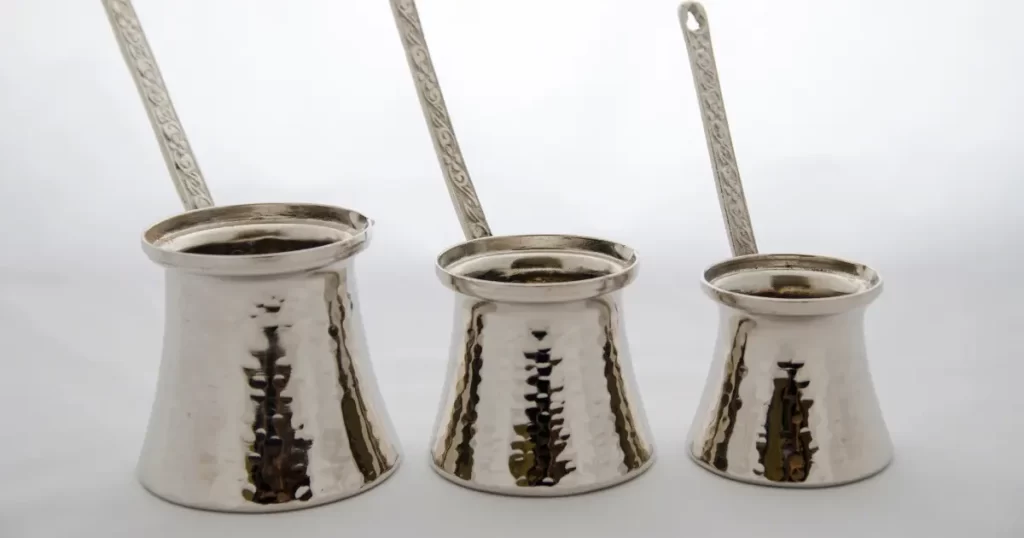
What materials are used to make cezve?
These 3 materials are the best for cezve:
Copper cezve
Copper is the most traditional and popular material. It provides excellent heat conductivity, allowing for even and efficient heat distribution. Copper cezves are known for their ability to heat up quickly and precisely, resulting in a flavorful cup of Turkish coffee.
Brass cezve
Brass is another common material used in cezve production. Like copper, brass offers good heat conductivity, ensuring consistent heating of the coffee and water mixture. Brass cezves are durable and resistant to corrosion, according to Rotax Metals.
Stainless steel cezve
In recent years, stainless steel cezves have gained popularity due to their durability and ease of maintenance. Stainless steel provides efficient heat distribution and is less prone to rusting or tarnishing. These cezves are often preferred for their modern appearance and practicality.
Final thoughts
For centuries, this beautifully crafted tool has been central to the art of making Turkish coffee, providing an aromatic and foamy delight to countless enthusiasts.
Choosing the right cezve, be it the traditional copper or brass or the more modern stainless steel, is essential for that authentic experience.
My journey through renowned bars and coffee shops over five years, as a barista, coffee aficionado, and former bartender, has honed my pursuit for the perfect cup. My passion for coffee isn’t just about the brew—it’s about sharing the knowledge and insights I’ve gleaned along the way.

